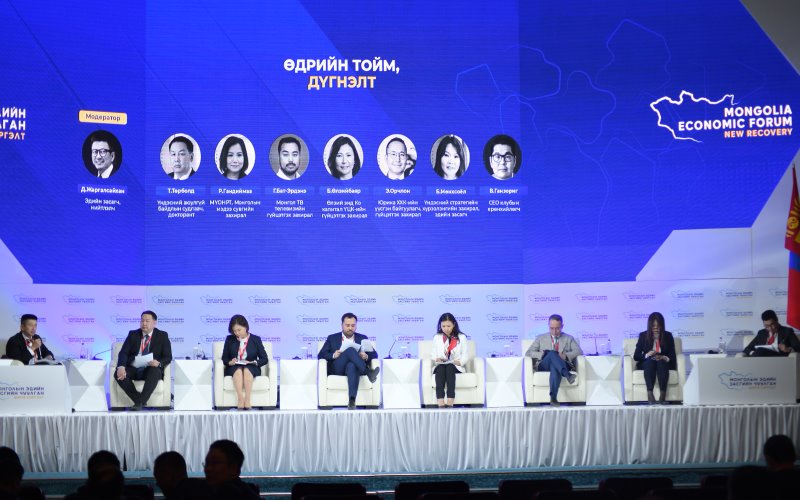Last week Ulaanbaatar hosted the 2022 ‘Mongolia Economic Forum,’ with hundreds of representatives from across the government, private sector and civil society coming together over two days to discuss the country’s pressing economic issues and the elements of the government’s ‘New Recovery’ Policy: Mongolia’s plan for recovery and renewal through public-private partnerships.

“A very difficult crisis between Russia and Ukraine that began on Feb 24 has become one of the most pressing geopolitical challenges for the world. This is a blow to the economies of countries that have just begun recovering from the two-year pandemic and to the positive outlook of the world’s banking and financial institutions on economic growth” Mongolian Prime Minister Luvsannamsrai Oyun-Erdene told the opening ceremony of the forum.

“Now, we are also facing the challenge of how to grow the Mongolian economy in these difficult times – but we are optimistic,” Oyun-Erdene said, noting that Mongolia has already started working on the restart of the economy.
The Forum is organized in accordance with the country’s ‘New Recovery’ Policy framework – introduced to revive the country’s economy post the COVID-19 pandemic, including comprehensive reforms in such fields as ports, energy, industry, green development and government productivity.
Nomin Chinbat is the Culture Minister for Mongolia and Chair of the Mongolia Economic Forum Working Group.
Speaking to EU Reporter, she said
“Mongolia is open for foreign direct investment and tourism, directly thanks to my country’s handling of the pandemic and the large uptake of vaccines across the country thanks to the government’s vaccination drive. Our economic future will be driven by the ‘New Recovery Policy’ which is the government’s plan for economic growth and prosperity.”
Fundamental to the growth of the economy was the action taken by the government on Covid. “It feels like we’re once again living under normal conditions. As of a month ago almost all restrictions were lifted. Amongst those who would be classed as vulnerable, we have vaccinated 96% with one dose, 92% with two doses of vaccine, whilst 53% of those classed as vulnerable have had three vaccine doses. We have vaccinated around 70% of the overall population with one shot, 67% with two shots and over 32% with a third booster shot.
“Other countries started by vaccinating the vulnerable, but we actually approached it the other way around. Here, multiple generations of families live together, so we started with the people who actually go out a lot into society rather than those staying at home. In my opinion, that was the right move.
“During the pandemic, we focussed on the health of the nation first, rightly, and thereafter shifting our attention to both that of public health and the wider economy. We are now laser-focused on the wider economy and driving growth.
“This means not just holding an economic forum, but demonstrating that our lives can go back to normal, that we’re open for business for anyone to come to Mongolia, that our tourism sector is open, and that our businesses are back too.
“It’s been challenging but having said that we’re back and have started to welcome tourists. We are formulating policies that can further bring tourists to the country.
“Just to name a couple, we have an open-air policy coming being brought forward as well as e-visas, where people can come to visit and obtain a visa at the border.
“We’re a small country with many different cultural backgrounds. We have a rich cultural heritage, which is something we are excited to show off as a result of our past. You have to remember that our nomadic culture and society were pretty much preserved as were up until thirty years ago.
“The economy changed to be more democratic, and tourism and business have opened up. As a result, we have managed to preserve our cultural heritage really well. We have a culture and nomadic lifestyle which is a bit different from what you may know, and so based on our nomadic history and background, our art and culture are very unique.
“Since I took over the position of Minister of Culture we have worked closely with a former advisor to UNESCO on our cultural creative industry development policy.
“And we’ve just recently finished with our White Paper and roadmap, so in that sense, we are working on creating alternative industry development opportunities.
“We’ve selected the 12 sectors in which to promote our creative industries, and from these, five sectors as our key sectors, including film, fine art, music, fashion and gaming, which is what our future generations are already interested in.
Our young people rarely watch TV anymore, they’re interested in living their life online in the metaverse. So we’ve created our policy based on the resources that we have and what we believe the future will look like, and then, using our heritage, we’re putting together a credible offer to a global audience. We’re making integrated plans with a number of parties to make sure that through content, art, and through culture we promote our country and develop our creative industries sector.
“So, from our country’s perspective, we’ve established our long-term plan – our Vision 2050. Based on that we have narrowed it down to a more immediate strategy, namely the ‘New Recovery’ Policy.
“These look into the problems and constraints that could stop our economy from developing further. I think one specific message we want to communicate from the Economic Forum is that we’re open for business, we’re open to working together, and we are looking for investors.
“We want investors to come in, we have projects available, and our government is open, transparent, and ready for cooperation. “


















































